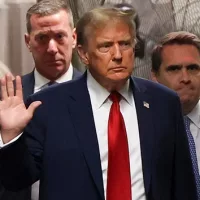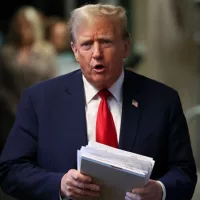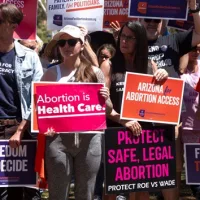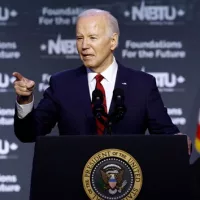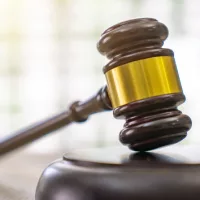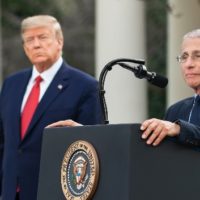
Official White House Photo by Andrea Hanks(WASHINGTON) — The federal government has been rolling out its response to the novel coronavirus crisis, trying to slow the spread and prop up the economy, amid a volatile stock market and record unemployment numbers.
After the nation’s top health officials warned the death toll from COVID-19 could reach 200,000, even with mitigation efforts, President Donald Trump has abruptly changed his messaging and extended the White House coronavirus guidelines through the month of April.
While last week he stressed a need for Americans to get back to work and said he envisioned “packed churches” on Easter, the president now says the COVID-19 death toll will peak around the holiday and signaled normalcy may not return until June 1 or later.
Trump said he would expand on his overall strategy moving forward and reveal which death-estimate models are driving his decision-making on Tuesday.
Here are the latest developments in the government response:
Fauci says masks for everyone “under very active consideration”
Dr. Anthony Fauci, director of the National Institute of Allergy and Infectious Diseases and the top health expert on the coronavirus task force, says the recommendation of masks for all Americans is “under very active consideration.”
Fauci told CNN Tuesday morning that the issue of facial coverings will be discussed at the task force meeting “today” but that the determination could only come “when we have enough” for health care workers.
“The idea of getting a much more broad community-wide use of masks outside of the health care setting is under very active discussion at the task force. The CDC group is looking at that very carefully,” Fauci said. “The thing that has inhibited that a bit is to make sure we don’t take away the supply of masks from the health care workers who need them.”
“But when we get in a situation where we have enough masks, I believe there will be some very serious consideration about more broadening this recommendation of using masks. We’re not there yet, but I think we’re close to coming to some determination,” Fauci added.
“If, in fact, a person who may or may not be infected wants to prevent infecting somebody else, one of the best ways to do that is with a mask, so perhaps that’s the best way to go,” Fauci said. “That’s under very active consideration. We’ll be discussing it today, this afternoon, at the task force meeting,” he told CNN.
His comments follow reporting in the Washington Post that the Centers for Disease Control and Prevention is considering recommending general public wear face coverings for all Americans in public, after initially telling Americans they’re only recommended for health care workers.
Hospitals across the country have sounded alarms in recent weeks that they lack the personal protective equipment like masks to treat COVID-19 patients.
Asked Monday about the potential for all Americans to start wearing masks, President Trump said it’s something he and the task force could discuss for the short-term.
“We haven’t discussed it to that extent, but it’s certainly something we could discuss,” Trump said. “We’re not going to be wearing masks forever, but it could be for a short period of time after we get back into gear.”
Fauci also said the data is starting to show “glimmers” that social distancing is taking an effect.
“If you look now, we are starting to see glimmers that that is actually having some dampening effect,” he said of mitigation efforts. “We hope, and I believe it will happen, that we may start seeing a turnaround, but we haven’t seen it yet.”
Army Corps of Engineers tackling shortages of medical sites, supplies and potentially staff
U.S. Army Lt. Gen. Todd Semonite, the commanding general of the Army Corps of Engineers spearheading an effort to build makeshift hospitals in response to the coronavirus crisis, said the scope of the initiative is “immense.”
“We’re looking right now at around 341 different facilities across all of the United States, very similar to the Javits Center,” Semonite told ABC News Chief Anchor George Stephanopoulos Tuesday on Good Morning America.
“We’ve got eight contracts under gear right now, people in centers constructing facilities, probably about 8,500 beds,” Semonite said. “By the end of the day, we should have another five contracts awarded with somewhere around another 4,000 beds.”
Semonite said they’re looking at hotels and dormitories as well as large, open spaces like convention centers, as potential sites. Some will house COVID-19 patients and some that will treat all other patients.
“Our thought was to make it extremely simple,” he added. “Find an existing facility that already has all the codes, has heat, has water, has I.T., has parking lots, and then just put in whatever we can like a hospital inside of that.”
The Army Corps of Engineers is working in lockstep with the Federal Emergency Management Agency, the Department of Health and Human Services, as well as local governments, Semonite said.
Pelosi previews 4th COVID-19 package
House Speaker Nancy Pelosi signaled on Monday that the priorities for the next COVID-19 stimulus package should include more protections for front line health care workers, with an added infrastructure element to boost the nation’s water systems and broadband capabilities.
Pelosi, who last week instructed her committees to begin coming up with proposals for the next relief bill, said that it is likely the next bill won’t get a vote until mid to late April, as the House is not scheduled to return until at least April 20th.
“I would not suspect that we would have any bipartisan legislation before we return after Easter and Passover. But we’re getting ready — and in some cases we are ready,” Pelosi said.
During the call with reporters, Pelosi said she wants to see an increase in aid for states, bolster front line health care worker safety protections, include another round of direct cash payments
Pelosi also ruled out the possibility of lawmakers moving towards remote voting amid the pandemic.
“There is no way we can engage in remote voting,” Pelosi said. “Let’s not waste time on something that is not going to happen.”
Copyright © 2020, ABC Audio. All rights reserved.






